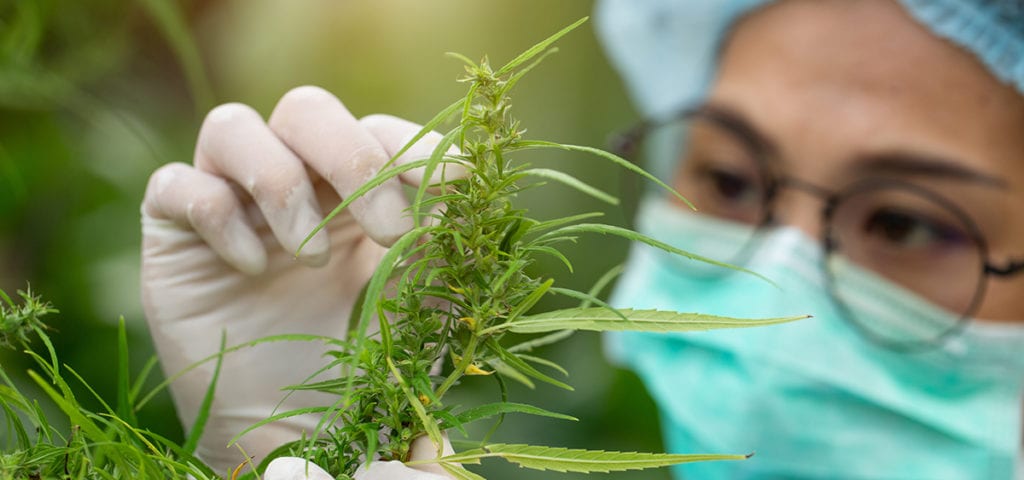A recent review published by a group of Canadian scientists suggests that cannabinoids could play a role in preventing and treating COVID-19 and Long-COVID.
Study Examines Cannabis as Treatment for COVID-19

Female scientist in a hemp field checking plants and flowers, alternative herbal medicine concept, Marijuana research, cbd cannabis oil, pharmaceptical industry.
Full story continued below.
Advertisement
In a comprehensive review, a group of scientists have brought forth intriguing insights into the potential role of cannabinoids in the battle against COVID-19. The study, titled “Cannabinoids and the Endocannabinoid System in Early SARS-CoV-2 Infection and Long COVID-19,” was authored Cassidy Scott, Stefan Hall, Juan Zhou, and Christian Lehmann. It was published in the Journal of Clinical Medicine.
By analyzing data from numerous past studies, the review explores how components of the cannabis plant could be key in both preventing the onset and mitigating the prolonged effects of COVID-19. The findings suggest that cannabinoids, notably in cannabis extracts, might inhibit the virus’s entry into cells, reduce harmful oxidative stress, and tame the overwhelming immune response often seen in severe cases. This research also highlights the promising role of cannabinoids in addressing the varied and persistent symptoms of Long-COVID.
According to the study, cannabinoids have shown potential in preventing viral entry, mitigating oxidative stress, and alleviating the cytokine storm associated with COVID-19. The study indicates that specific cannabis extracts can downregulate ACE2 protein levels in key tissues, hindering the virus’s entry into human cells. The authors state that this aspect is critical, considering that ACE2 is the primary gateway for the virus.
The review also discusses cannabinoids’ role in addressing oxidative stress, a significant factor in COVID-19’s pathogenesis. By transforming free radicals into less active forms, cannabinoids like CBD could help mitigate the harmful effects of oxidative stress seen in severe COVID-19 cases.
According to the study, cannabinoids may also have a beneficial effect on the cytokine storm, a severe immune response triggered by COVID-19. Cannabinoids have demonstrated effectiveness in reducing inflammatory cytokines, suggesting their potential in managing such immune responses.
Moving to post-acute COVID-19, commonly known as Long-COVID, the study sheds light on the potential of cannabinoids in treating persistent symptoms like depression, anxiety, post-traumatic stress injury, insomnia, pain, and decreased appetite. The endocannabinoid system’s involvement in various neurological processes makes it a target for addressing these neuropsychiatric symptoms.
The study also considered the various methods of consumption and different types of cannabis products used by consumers, and the authors point out that smoke inhalation may have negative effects for patients suffering from respiratory illness that could offset therapeutic benefits.
“Although smoking and vaporizing cannabis are often preferred by patients, as they provide the fastest onset of effects, it is possible that the potential benefits of cannabinoid treatments are outweighed by the negative respiratory health consequences associated with smoking. Studies have suggested that the use of cannabis vaporizers is associated with fewer respiratory symptoms than smoking cannabis, as they do not heat marijuana to the point of combustion.” – Cassidy Scott, et al
The authors underscore the need for further research in this domain. While the initial findings are promising, they caution that these are preliminary and derived from studies not exclusively focused on COVID-19. Therefore, more targeted and extensive research, including clinical trials, is essential to fully comprehend the role and efficacy of cannabinoids in treating early and post-acute SARS-CoV-2 infections. The authors advocate for a deeper dive into the pharmacological aspects and potential therapeutic applications of the endocannabinoid system, urging the scientific community to explore this avenue more rigorously.
Get daily news insights in your inbox. Subscribe
End